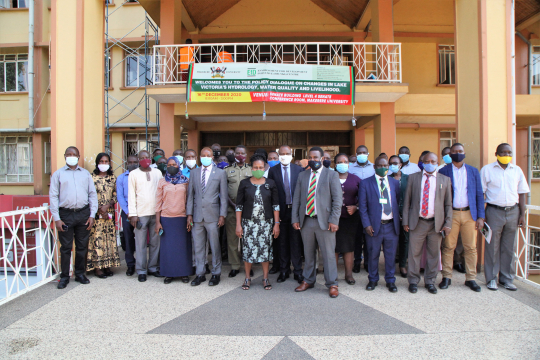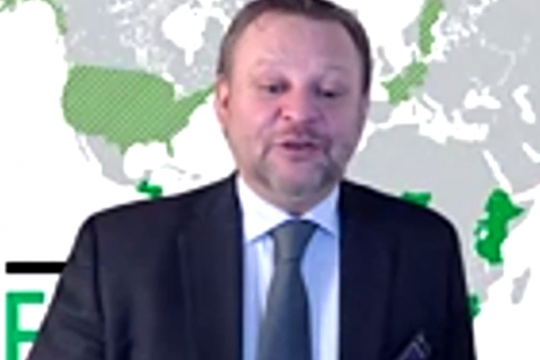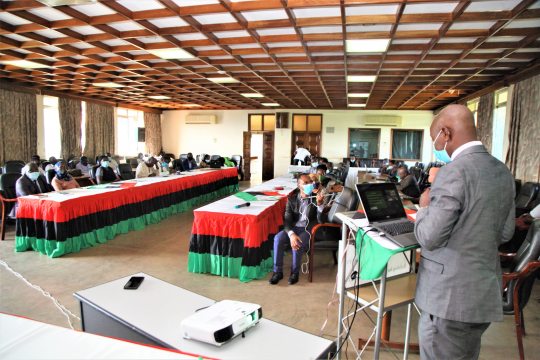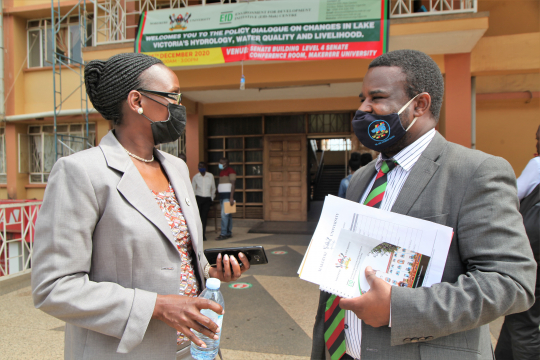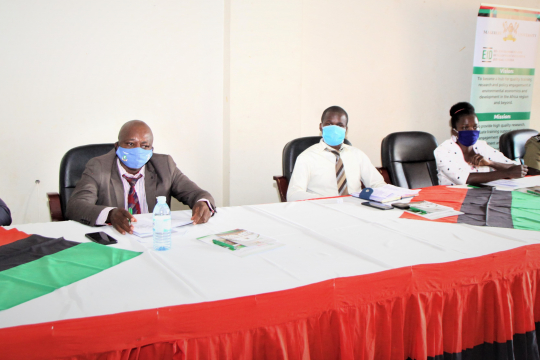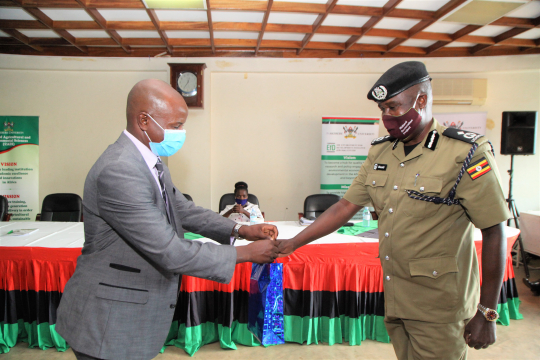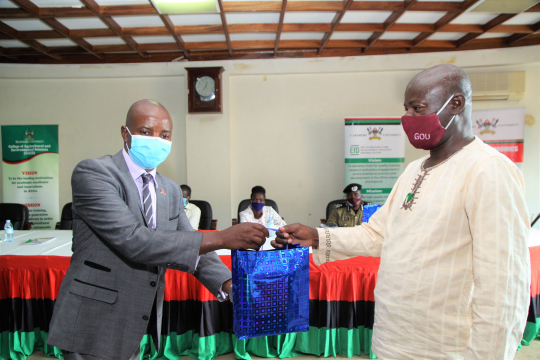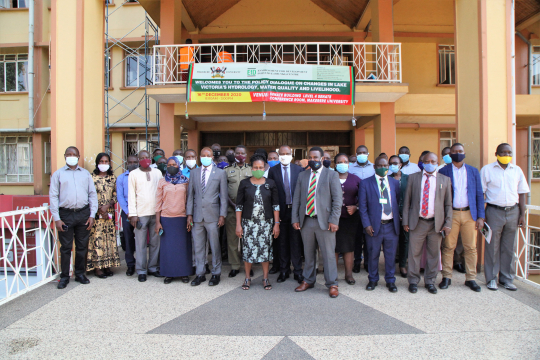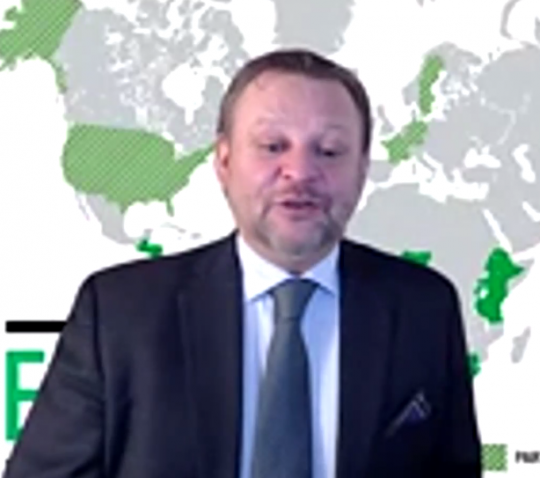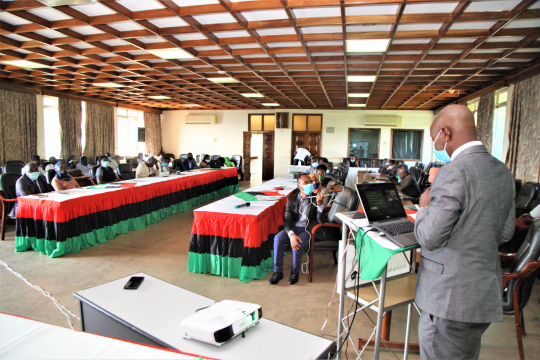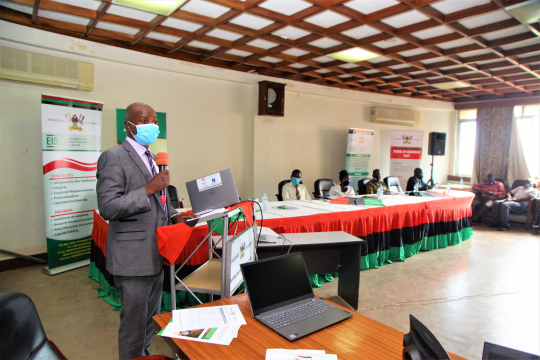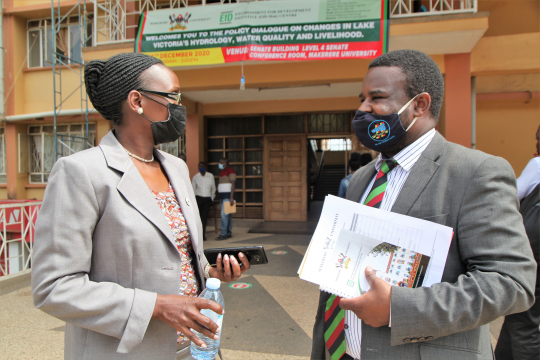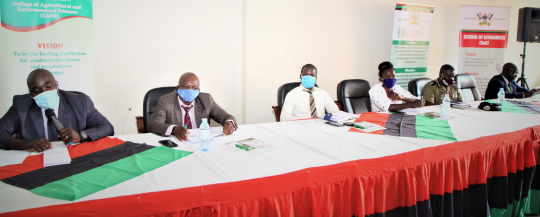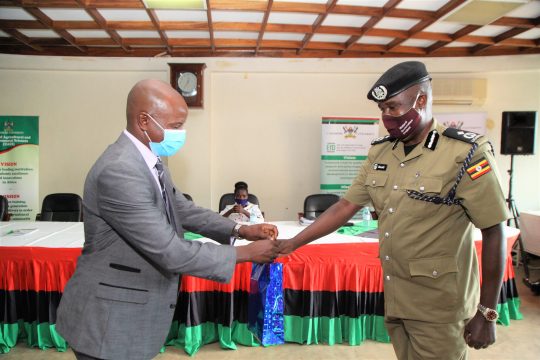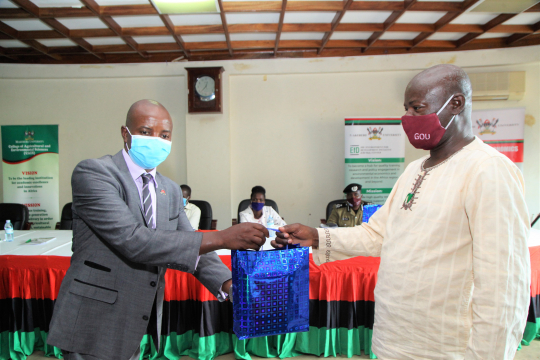The end of year EfD-Mak Centre policy dialogue was held on 16th December, 2020 at Makerere University Senate Conference Hall. The policy dialogue attracted over 60 participants drawn from the members of the public, private sector, policy makers, civil society, EfD secretariat in Sweden, the academia and students.
The dialogue was opened by the Director, Environment for Development Initiative (EfD) Secretariat at the University of Gothenburg, Sweden, Prof. Gunnar Kohlin via zoom.
Prof. Gunnar informed participants that the Swedish International Development Agency (SIDA) has renewed a five-year financing plan of EfD activities across the world.
He said, by the year 2020, EfD centers had increased from 6 to 13 across the world. He explained that the idea of sustainable development led to formation of EfD whose major role is to build capacity in environmental economics through capacity building and sponsoring action oriented research projects.
Prof. Gunnar added that EfD centers are largely engaged in solving the world’s most pressing environmental and development challenges such as climate change and sustainable development including green growth, environmental conservation, sustainable agriculture and forestry.
The Principal College of Business and Management Sciences (CoBAMS), Makerere University reiterated the importance of policy dialogues and called for more frequent policy engagements between members of the academia, researchers and the policy makers including the communities who in most cases are the victims of what is being discussed in the policy dialogue.
He appreciated EfD Secretariat in Sweden and SIDA for financing EfD-Mak centre activities. He emphasized the need for policy dialogue to be informed by research findings. He informed the participants that the college had allocated funds to finance community engagements by all the three schools that make up the college.
Presenting the concept note on “Changes in Lake Victoria’s Hydrology, Water Quality and Livelihoods”, the Director, EfD-Mak Center, Assoc. Prof. Edward Bbaale highlighted the center’s milestones throughout the year.
He informed participants that the EfD-Mak Centre is mandated to carry out research, capacity building training workshops, short courses in environmental and natural resource economics and policy engagements in the areas of environment and natural resources and advise government on how best, the environment can be managed using evidence generated from research.
He affirmed that the center has resources and capacity to implement its mandate calling for further collaboration with stakeholders such as policy makers in parliament and mainstream government; implementers such as National Environmental Management Authority (NEMA), National Forestry Authority (NFA), Uganda Wildlife Authority (UWA), National Planning Authority (NPA) among others; civil society organizations; Private sector and development partners such as UNDP and World Bank.
The Director explained that Lake Victoria Basin (LVB) is a critical trans-boundary natural resource, underpinning the economy and livelihoods of the population, acting as a waste repository and providing food, energy, irrigation, drinking water, tourism and transportation to the surrounding communities and, is the primary modulator of the region’s climate.
Lake Victoria does not only support the economies and livelihoods of East African countries – Burundi, Kenya, Rwanda, Tanzania and Uganda but also Ethiopia, South Sudan, Sudan and Egypt. Despite its importance, the LVB has and is still undergoing intense environmental degradation for decades, resulting in significant ecological and economic challenges”, Prof. .Bbaale stated.
He said, during the period of late January 2020, the effects of Lake Victoria bursting its banks started to be felt with several landing sites, settlements and infrastructure such as roads damaged by floods leaving almost half a million people homeless and property worth billions of shillings destroyed in Uganda, Kenya and Tanzania.
He attributed the bursting of the banks to Sedimentation worsened by the shallowness of Lake Victoria, many tributaries, and with only the White Nile and evaporation as outlets.
The Director decried the level of pollution from the neighboring towns and cities for example Nakivubo stream from Kampala, Industrial wastes, poorly treated municipal wastes, gold mining in Tanzania among others making it hard for the fish to multiply and in terms of livelihood, affected fish catch and jobs reducing the business activity around the lake.
“Lake sedimentation and human activities such as agriculture near the lake shores and failure to observe the buffer zone of 200 meters has affected electricity generation in Uganda. For example on 14th March 2020, the entire country faced load shading due to a floating island on the lake near the Owen Falls Dam.
Urgent efforts to save the lake are need and let me take this opportunity to call upon every participants here to reflect on what needs to be done right to mitigate the changes in Lake Victoria’s water levels, quality and livelihoods”, The Director implored.
Makerere University Deputy Vice Chancellor in charge of Finance and Administration (DVC (F& A) Prof. Josephine Nabukenya congratulated the EfD-Mak center for holding a successful end of year policy dialogue with a timely topic.
The DVC (F&A) appreciated the EfD global hub at the School of Economics and Law, University of Gothenburg, Sweden and SIDA for funding EfD-Mak Centre activities.
Prof. Nabukenya observed that Lake Victoria is a major part of the ENR sector and a key driver of Uganda’s economic growth and development process.
“EfD provides an essential platform for the country such as Uganda where the majority of people directly depends on soil for survival. The Centre will play a big role in promoting green growth and sustainable development in the country,” She said.
She outlined four existing gaps that are affecting the management and utilization of environmental and Natural resources in Uganda which can be ably filled by EfD. The gaps include: the human resource gap, the knowledge gap, the communication gap and the institutional gap.
“In conducting policy research and dialogues in collaboration with various government departments, private sector, civil society and the general public, the EfD-Mak Centre will play a big role in the implementation and achievement of the National Development plan (NDP) III and vision 2040 as well as other global agenda such as United Nations SDGs”, Prof. Nabukenya said.
She thanked the center Directors and staff for securing the centre that is championing academic, policy, institutional and individual capacity building and policy outreach in priority areas of agriculture and sustainable development, climate change, fisheries, forestry and energy, national parks and wildlife, water resource management and policy design.
“The policy dialogue is timely given that Uganda has experienced rising water levels in all water bodies across the country. I welcome you all to Makerere university and wish you good deliberations on strategies to improve the utilization and management of our water bodies”, She said.
Dr. John Seruyange, a Lecturer from the School of Economics and a Research fellow, EfD-Mak Centre speaking as a panelist called on government institutions involved in the management of environment and natural resources and the general public to reflect on what went wrong as a country on the management and utilization of natural resources.
This, the don said will enable to discover all the mistakes, challenges and what needs to be done to correct the mistakes and solve the current challenges being faced in the ENR sector.
“While handling problems facing water bodies in Uganda, you need to consider ownership since there are those which are owned by Uganda alone and those which have trans-boundary ownership, the policies to manage the two should differ.
For trans-boundary resources, there is need for cooperation among all the member countries sharing the water resource. Many problems facing trans-boundary water resources such as Lake Victoria are due to member countries preferring political sovereignty over environmental conservation and protection. Environmental problems respect no boarder and thus the need for a collective effort among all the member countries to preserve the environment”, Dr. Seruyange said.
He expressed the need for extending water nearer the farmers to deter them from encroaching on the buffer zone and water catchment areas.
Dr. Seruyange appealed to policy makers to address problems such as poverty that force people to resort to environmental degradation as a way of survival.
He also called for full participation of all stakeholders on the issues of environmental degradation including the host communities, policy makers, experts, regulators, media and other parties that are involved in the sector. He also called for collaboration among all the entities involved in the management and regulation of ENR.
The Assistant Commissioner of Police Okoshi Simon who is also the Deputy Commandant of Environmental Police implored the key government departments in charge of water resources and the environment generally to enforce the existing laws on environmental management.
He said that law enforcement in Uganda has become so difficult and decried political and public interference in their work asking the local community to get involved in protecting the water bodies and the environment at large.
“There is inadequate capacity and financing to respond to all environmental degradation issues across the country. I request that environmental regulations should be free from politics or any other interference, There is need for increased sensitization of masses on environmental conservation and protection people should be given alternatives before being evicted or displaced with a view of creating room for environmental conservation.”, The Commissioner requested.
Wakiso District Environmental Officer Ms. Nankya Harriet, reported that as local governments, they were trying their best to ensure that the environmental resources in their area of jurisdiction are kept free from encroachment.
“ We are always involved in analysis of environmental impact evaluation plans by the intending investors but we continue to face problem of interference, inadequate budgets and human resource”, She said.
The Ag. Director Fisheries Resources from the Ministry of Agriculture, Animal Industry and Fisheries Dr. Edward Rukunya, said government has come up with many Acts and Legal instruments to protect the environment.
“Government uses both command and control and market based measures to protect the environment. Government is reviewing some environmental regulations to ensure that they meet the current circumstances and environmental protection needs. We are soon coming up with a fisheries act to properly regulate fishing activities on the lake and that the ministry is involved in research to better the management and utilization of water bodies. What we need is a clear institution to finance regulation activities on water bodies”, Dr. Rukunya said.
Mr. Aaron Werikhe the Planner Environment and Natural Resources from the National Planning Authority noted that although Uganda has registered some degree of ENR regulation, there still exists capacity gaps in the regulatory bodies, lack of adequate monitoring of ENR, inadequate financing, political interference and lack of binding policies among the countries sharing Lake Victoria.
“For better governance of water bodies, all policies should be people centered. There should be absence of political interference, engagement of the young people in knowing about conservation right from the childhood like it is done in the western world, the need to promote the green initiatives and promote recycling centers to handle rubbish”, He suggested
